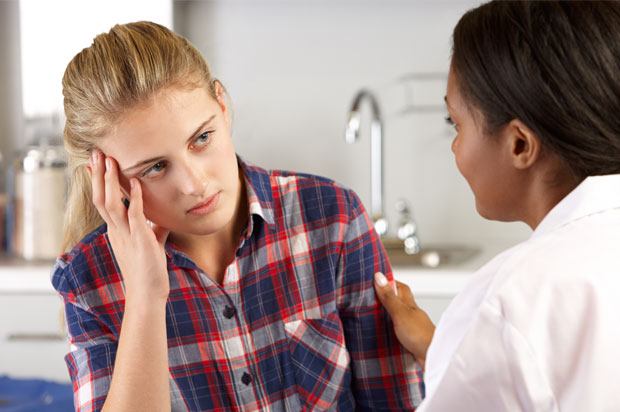Self-harm health professionals
The help you get will depend on your individual circumstances, the nature of your self-harm, your age, and what services are available in your area. Confused? The Mix explains...

Health professionals can offer you lots of support.
Self-referral
Some young people who self-harm will seek help voluntarily through their doctor (GP) youth worker, key worker, school nurse or college counsellor. In many areas there are free young people’s counselling and mental health support services that you can refer yourself to. If you are nervous about making that first contact with a counselling or support service you could ask your GP, another trusted professional, or a friend, to refer you.
It’s a good idea to see your GP if you’ve decided you need help with self-harm – some specialist mental health services, such as psychology, can usually only be accessed through a referral by your GP.
If you’ve been to see your GP, or talked to a social worker, teacher or learning mentor about any mental health issue or self-harming, you may find that they are able to give you the support and help you need. However, they may suggest that more specialist mental health support is needed, especially if your problems are having a negative impact on your day-to-day life.
If there is a counsellor or community psychiatric nurse (CPN) at your local surgery your GP may refer you there. You could also be referred to a Primary Care Mental health Team (for people over 16) where there are specialists who deal with common mental health problems, such as depression and anxiety.
If your GP or another professional feels you have more serious mental health problems and may require a higher level of care, they may refer you to Community Mental Health Team (the name can vary in different areas) or the local Child & Adolescent Mental Health if you’re under 16.
Community Mental Health Teams
These teams are made up of a range of professionals who are specially trained in mental health, including psychiatrists; social workers; psychologists; counsellors; psychotherapists; CPNs; and occupational therapists. These teams can be based in a hospital or may be in less formal settings.
The first thing that is likely to happen when you attend is an assessment of your mental health. You will be asked about the problems you are having; how you are feeling; how this is affecting your life and what support you have. The assessment will help them decide what treatment and service you receive and give you the opportunity to ask questions.
Child and Adolescent Mental Health Services (CAMHS)
CAMHS are made up of a similar range of professionals as adult mental health teams, but all staff are specially trained to work with children and young people. Although set up for young people up to the age of 16, about half of the services now cater for people up to the age of 18.
As with adult services, the treatment and support you receive will be based on an assessment and you may be offered individual sessions, therapy, group support or medication depending on the problems you are experiencing.
In some cases it can be useful to involve your family, especially if there are problems at home or they are struggling to understand and support you. Family therapy may be offered in order to address problems and find ways of improving life at home, but this may not be something you want – if you’re worried about this talk to your CAMHS worker.
Crisis resolution teams
Many areas have crisis teams aimed at people over 16 who are experiencing a crisis as a result of a serious mental health illness – especially if someone is feeling suicidal.
Crisis resolution teams can consist of a mixture of psychiatrists, psychiatric nursing staff, social workers and support workers, and are usually available 24-hours a day, seven days a week. It may be that they’ve already met you if you’ve accessed mental health services before, or it could be for the first time.
Depending on the area you live in, they can help you before things get to the stage where you need to go into hospital and may see you within a few hours of referral by your GP or psychiatrist. They will also be on hand to monitor your situation if you’re being discharged from hospital, and to make sure you are referred on to other relevant services.
Emergency help
If you’ve ended up at Accident and Emergency (A&E) because of self-harming, you will be assessed to see if the doctor feels you can go home.
“If the doctor feels you aren’t safe for discharge then they may ask you to stay until the morning so you can see the CPN,” says Dr Katie Muscroft, an A&E doctor. “If the doctor feels you are at high risk of suicide they may ask for someone to come and see you immediately – this may be a psychiatrist or a crisis team which is usually made up of CPNs, plus social workers and doctors.
“Once assessed, the crisis team may feel you need to be admitted to a hospital, have extra support from a health professional when you get home, or that you’re safe for discharge. Normally you will always be asked to have a follow-up appointment from your GP.”
Next Steps
- TESS text and email support service runs Monday to Friday from 7pm to 9pm for girls and women aged under 25. Text them on 0780 047 2908.
- Anyone can contact the Samaritans on their 24-hour helpline to talk things through. 116 123
- selfharmUK provides information and advice about self harm. You can ask a question to their expert panel or share your story.
- Chat about this subject on our Discussion Boards.
By Julia Pearlman
Updated on 23-Dec-2015
Photo of girl with GP by Shutterstock.
Sorry, comments closed
No featured article










